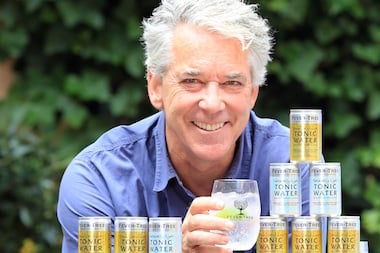Meet the Pro50: Fever-Tree’s productivity secrets

Premium mixer brand Fever-Tree wowed the stock market with its hyper-productive structure when it floated on the London Stock Exchange towards the end of 2014. Professional Manager talks to co-founder Charles Rolls to find out the recipe behind the brand’s success
Matt ScottTo create the perfect tonic water for British stalwart the G&T, Charles Rolls and Tim Warrilow will stop at nothing.
The co-founders of Fever-Tree have stared down the barrel of a gun in the Ivory Coast and been interrogated by child soldiers in Rwanda. But, supported by only 13 employees, the two men have reinvented the drinks mixer market and gone from zero to a £23m global-turnover brand serving more than 50 countries in 10 years, with an IPO via two rounds of private equity thrown into the mix for good measure.
This is full-strength productivity.
The secret, says Rolls, is creating a highly outsourced business model. Fever-Tree is in control of the key elements: marketing, sales, quality control and finance. Everything else, where they are not the experts, is outsourced.
“We knew what the product needed to taste like and what the brand message needed to be, so we stuck to that,” he says. “We needed to focus on our core skills. Those didn’t include bottling, crop production and manufacturing.” These tasks, therefore, are given to trusted partners.
Scouring the globe
The central cog in the Fever-Tree machine – sourcing of the world’s finest ingredients – remains under the watchful eyes of Rolls and Warrillow. It’s this that makes Fever-Tree the first premium Indian tonic water.
“For the key ingredients we sourced things ourselves,” Rolls says. “We had to form a close working relationship with the suppliers to ensure there was that attention to detail that we needed.
“Those key ingredients are essential for the brand. We were the first to say that you can afford to buy those really good ingredients and make the tonic water the best it can be.”
The search for these ingredients has seen the partnership scour the globe, with quinine from the Rwanda-Congo border, lemon extract from Sicily, bitter orange from Tanzania and three different types of ginger from the Ivory Coast, Nigeria and south west India.
Closer to home, the company has expanded in the UK market through reaching out to bartenders and journalists to make Fever-Tree tonic water the partner of choice for premium spirits brands.
This is then combined with a direct sales model that Rolls says helps the company maintain a relationship with their buyers and drive sales growth.
“The partnerships we have with spirits companies and supermarkets are critical,” he says. “You have to be close to those core buyers, and that is all about frequency of contact.
“It is hard to maintain that frequency, but it is critical – you have to get as close as they will let you.”
Contrastingly, in overseas markets Fever-Tree relies on import partners, with their extensive knowledge of the local marketplace, to forge relationships with distributors and grow direct sales.
Leading by example

When it comes to managing the small workforce back at Fever-Tree HQ, Rolls is very much a practitioner of lead-by-example.
Talking to the former Plymouth Gin managing director, you get a real sense of the passion he has for the drinks industry, and this is something he also values in his staff.
“Dedication is essential,” he says. “You have to be emotionally involved with the product and it is great to see that buzz in the office.
“But it is a bit easier for us as we have a product that is fun and is easy to relate to.”
Equally important is ensuring that professionalism is prevalent at Fever-Tree, while maintaining the entrepreneurialism and agility.
“With fast growth you end up sucking people up the business and then they put there hands up and say: “I want more responsibility”,” he says. “They then end up leading a team. This gives people the challenges they want and gives them every chance to fulfil their potential.
“But some people are better suited to management than others, so you have to make sure you select the right people for the role with the right skills, and then offer them support if necessary. It is very much leadership-by-example.”
Staff are encouraged to pursue professional development courses and acquire qualifications, and Rolls is professionalising key areas of the business; for example, he brought in a new CFO this year.
Rolls adds: “We are professionally run but we are still small and fast growing, so we have to maintain the right mentality: to do things in a sensible, logical, creative and flexible way.”
So, what next for Fever-Tree as it looks to eat away at market leader Schweppes?
“The premium mixer market is just starting out, but premium spirits are much older, especially in the US,” he says. “So there are definitely lots of opportunities out there.
“It’s all about more of the same, but better.”
Is productivity on your priority list for the new year? Tell CMI about your expectations for 2016 in its latest research survey

Press & Media Enquiries
For more information or to request interviews, contact CMI's Press Team on 020 7421 2705 or email press.office@managers.org.uk


